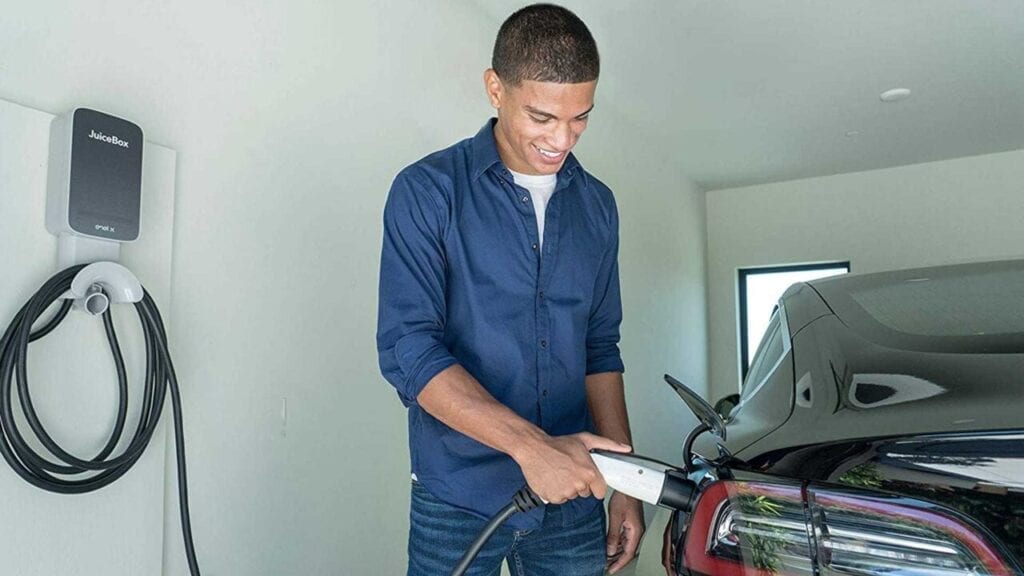Partnership's New Charge—Pair EVs with Utilities, Grid
Integrating electric vehicles (EVs) with the power grid has become a focus for utilities, particularly in areas with large concentrations of EVs. It also is another way for utilities to expand their business models, as they partner with companies involved with charging stations and residential energy storage applications.
EnergyHub, a distributed energy resources (DERs) management platform for utilities, and Enel X, the Enel Group’s advanced energy services business line, on Dec. 10 announced a partnership designed to expand the availability of EV charging stations as a flexible DER for utilities. Enel X, a charger manufacturer and service provider, and EnergyHub will work to help utilities manage customer-owned Enel X smart EV charging stations through EnergyHub’s Mercury DERMS (distributed energy resource management system) platform.
Baltimore Gas & Electric (BG&E) and Eversource are among the first utilities to utilize the partnership, enrolling customers who use Enel X’s JuiceBox (Figure 1) residential smart charging stations. The plan announced Thursday comes as Dominion Energy works on a project to use electric school buses as a grid flexibility asset, and as more utilities work to integrate DERs into the grid.

“We see managed EV charging as an important and growing piece of our DER portfolio, which we leverage not just during the hottest days of the year, but to manage demand year-round,” said Michael Goldman, director of energy efficiency for Eversource. “We’re glad to be able to allow more customers to participate by offering incentives to our customers with JuiceBox EV chargers.”
Electrification of Transportation
Utilities continue to prepare for the electrification of transportation—it’s been a regular topic of discussion at POWER’s annual Distributed Energy Conference—although analysts have differed on how quickly a majority of U.S. drivers will transition from combustion engine vehicles to EVs. Bloomberg New Energy has said it expects EVs will account for the bulk of passenger car sales by 2040. In that same research, smart EV charging technology, which encourages customers to charge at optimal times during the day, is estimated to save grid operators 30% to 70% of electrical infrastructure upgrade costs as it provides an efficiency upgrade for the electricity supply.
The partnership with Enel X, which has more than 60,000 consumer charging stations deployed across the U.S., “expands the ecosystem of EV chargers that utilities can manage with EnergyHub’s Mercury DERMS,” the companies said in a news release Thursday.
“Working with EnergyHub and Enel X allows us to partner with our customers to manage flexible EV charging load, preparing us for the future of transportation electrification, while also supporting the grid as whole,” said Kristy Fleischman Groncki, manager of strategic programs at BG&E. “Our EV Smart program managed with EnergyHub rewards customers for contributing to the grid while using their preferred EV charging equipment.”
EnergyHub and Enel X on Thursday said their partnership “enables utilities to grow their DER portfolios deployed with EnergyHub by managing enrolled Enel X JuiceBox smart charging stations in a service territory. Through the integration of EnergyHub’s Mercury DERMS platform with Enel X’s cloud-based JuiceNet smart EV charging software, utilities can forecast load, intelligently instruct, and monitor load results from customer-owned Enel X charging stations.”
“Preparing for mass adoption of electric vehicles and EV charging infrastructure is one of the most critical steps utilities should be taking today to lead the energy transition,” said Giovanni Bertolino, head of e-mobility for Enel X North America. “Enel X’s expanded partnership with EnergyHub adds to over thirty utility programs we have underway and further demonstrates the ability of our product portfolio and JuiceNet software platform to seamlessly integrate with third-party platforms to deliver best-in-class solutions and added grid flexibility to utilities everywhere.”
BG&E, Maryland Support EVs
BG&E’s participation in the program is an example of how customers with EVs could benefit. Utility time-of-use (TOU) rates incentivize EV owners with Level 2 smart charging stations to utilize off-peak charging, which provides savings on the electric bill for the customer, and reduces stress on the power grid during periods of peak electricity demand. The state of Maryland has a goal to have 300,000 EVs on the road by 2025, and the state’s Public Utilities Commission has authorized local utilities to install a network of 5,000 residential, workplace, and public charging stations.
BG&E has deployed the Mercury DERMS to implement an EV-TOU rate that incentives off-peak charging, through the gathering and analyzing of charging data. The data “is provided at a 15-minute granularity from customers’ Level 2 charging equipment, including Enel X JuiceBox smart chargers,” according to the companies.
Matt Johnson, VP of business development at EnergyHub, said, “Integrating with a leader in EV charging and clean energy solutions like Enel X demonstrates our commitment to providing a comprehensive EV managed charging solution to utilities. We’re excited to partner with Enel X to enhance our ability to deploy a comprehensive grid-edge management solution that optimizes the value of customer-owned distributed energy resources for our clients.”
The integration of the Mercury DERMS platform with Enel X’s JuiceNet smart EV charging software platform is enabled by JuiceNet, which optimizes the energy consumption of the JuiceBox EV charging station to align with grid conditions, while ensuring customer mobility requirements are met, according to the companies. The Mercury DERMS platform allows utilities to monitor, coordinate, and orchestrate EV charging in concert with other DERs.
EnergyHub already works with more than 40 utilities through its platform to facilitate various programs and services, including demand side management. Enel X, meanwhile, manages about 130,000 public and private smart EV charging stations worldwide.
—Darrell Proctor is associate editor for POWER (@POWERmagazine).